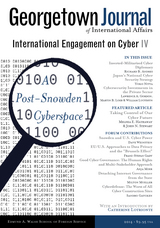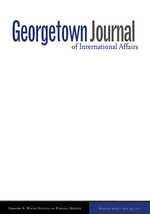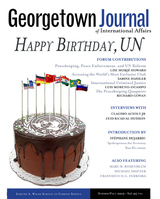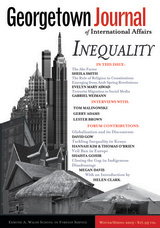
In 2007 Georgetown University established the CyberProject under the auspices of the Institute for Law, Science & Global Security. The CyberProject seeks to hone the Institute’s resources to help policymakers develop a greater understanding of current international cybersecurity issues. On 10 April 2012, the Institute held its second annual international cyber conference entitled, “International Engagement on Cyber: Establishing International Norms & Improved Cyber Security.” Under the direction of the CyberProject and the Institute, we have devoted this second annual special issue of the Georgetown Journal of International Affairs to cyber exclusively, and the challenges that societies face as they seek to establish norms of behavior so all may coexist peacefully in this domain. In the pages that follow, participants from the Institute’s second international cyber conference and other leaders, domestic and foreign, lay out their visions for protecting cyberspace and maintaining its stability.
The Georgetown Journal of International Affairs is the official publication of the Edmund A. Walsh School of Foreign Service at Georgetown University. Each issue of the journal provides readers with a diverse array of timely, peer-reviewed content penned by top policymakers, business leaders, and academic luminaries. Annual peer reviewed ‘special editions’ feature collected academic analysis on rapidly changing domains within the arena of international affairs, including the International Engagement on Cyber series.

A great deal has transpired in the cyber realm during the past year. These events, particularly the Snowden Affair, have drastically shaped the debate over state power projection and its consequences. Global public discourse previously tended to center upon the Internet as a democratizing force, capable of weakening the control of the nation-state. The Internet transcended national borders and empowered the masses at the expense of traditional power blocks. However, this battle for the control of cyberspace is far from over. The nation-state is attempting to retrench its power in the digital realm, and the forces of centralization are appearing to gain strength in the struggle between diffusion and consolidation. This shift has raised serious questions regarding the responsibilities and limits of government cyber control. State Building on a New Frontier—the third edition of our annual International Engagement on Cyber series—attempts to explore some of these difficult themes. This edition also features articles that deal with the technical side of the cyber discussion, namely attempts to create appropriate standards for continuing infrastructure development.
The Georgetown Journal of International Affairs is the official publication of the Edmund A. Walsh School of Foreign Service at Georgetown University. Each issue of the journal provides readers with a diverse array of timely, peer-reviewed content penned by top policymakers, business leaders, and academic luminaries. Annual peer reviewed ‘special editions’ feature collected academic analysis on rapidly changing domains within the arena of international affairs, including the International Engagement on Cyber series.

Each spring, the Cyber Project at Georgetown University’s Institute for Law, Science, and Global Security convenes a conference of leading international experts from academia, the private sector, and government to address cutting-edge issues in cybersecurity.
This issue begins with a group of articles under the theme A Post-Snowden Cyberspace, describing how Edward Snowden’s revelations directly or indirectly changed the way the global community understands cybersecurity and cyber law. Other topics covered include cyber weapons, cyber deterrence, Japan’s cybersecurity strategy, data protection in the private sector, executive accountability for data breaches, minimum security standards for connected devices, and the problem of underinvestment in cybersecurity.
Please note, this special issue is not included in the subscription to the journal.
The Georgetown Journal of International Affairs is the official publication of the Edmund A. Walsh School of Foreign Service at Georgetown University. Each issue of the journal provides readers with a diverse array of timely, peer-reviewed content penned by top policymakers, business leaders, and academic luminaries.

This fifth edition in the International Engagement on Cyber series focuses on securing critical infrastructure. The centrality of critical infrastructure in the Obama administration’s recent cybersecurity initiatives demonstrates the timeliness of this topic for greater review and scholarly input. In this manner, articles in this issue uncover the role and extent of international law and norms, public-private cooperation, as well as novel ways of conceptualizing ‘security’ in efforts to improve critical infrastructure cybersecurity. Other pieces provide case studies on the telecommunications, power, and energy sectors to generate an in-depth understanding of specific responses to security concerns in different infrastructure areas.
Additional contributions examine regulatory activities in cyberspace, the potential value of cryptocurrency, the evolution of cloud computing, cybersecurity in Brazil, as well as the integration of cyber in the military strategies of Russia, China, and the United States. The diversity of these topics demonstrates the Journal’s continued commitment to pursuing the myriad facets that compromise the field of cyber.
Please note, this special issue is not included in the subscription to the journal.

The Georgetown Journal of International Affairs has once again partnered with the Cyber Project at Georgetown University’s Institute for Law, Science, and Global Security to publish the sixth special issue of International Engagement on Cyber. This special issue of the journal seeks to uncover timely topics, broaden dialogue, and advance knowledge within the field of cyber. The articles are written by an international group of leading scholars, practitioners, and policymakers. The Forum of this issue evaluates the US Department of Defense’s 2015 Cyber Strategy and its efficacy in meeting cyber threats. Other topics covered in this issue include applying Just War Theory to the cyber capabilities of non-state actors including ISIS and Anonymous, litigating competing perspectives on the establishment of cyber norms, assessing tensions on the Korean peninsula in the cyber domain, and much more.
The Georgetown Journal of International Affairs is the official publication of the Edmund A. Walsh School of Foreign Service at Georgetown University. The journal was founded to serve as an academic resource for scholars, business leaders, policy makers, and students of international relations, cultivating a dialogue accessible to those with all levels of knowledge about foreign affairs and international politics. Each issue of the journal provides readers with a diverse array of timely, peer-reviewed content that bridges the gap between the work done by news outlets and that done by traditional academic journals.


The latest round of leadership changes at the IMF and the World Bank has generated increasingly intense criticism of the tacit Western hold on governance of these institutions. While this dynamic is indicative of global power adjustments, it also signals a paradigm shift in thought about issues and methodology of development and growth. John Maynard Keynes famously noted the influence economists exert on leaders as: “Practical men, who believe themselves to be quite exempt from any intellectual influence, are usually the slaves of some defunct economist.” Perhaps it is time, especially in the field of development, to question the traditional monopoly of economists, and to effectively include scientists, anthropologists, and others to provide collaborative thought leadership.
The Forum of this issue brings together leading policy makers, business professionals, and academics to evaluate the changing landscape of international development. New forms of assistance and greater connectivity among development stakeholders have reduced relevance of the traditional role of multilateral or bilateral agents of foreign aid and pillar organizations of the Washington Consensus. These bodies must adapt to an ever-changing world while being constrained by laws and bureaucratic processes. There is also a need to balance the perennial temptation of using official development assistance to promote national agenda with the interests of recipients. To deal with these and similar challenges effectively, the future lies in building networks of hybrid partnerships between governments, individuals, and other stakeholders in development.
The Georgetown Journal of International Affairs is the official publication of the Edmund A. Walsh School of Foreign Service at Georgetown University. Each issue of the journal provides readers with a diverse array of timely, peer-reviewed content penned by top policymakers, business leaders, and academic luminaries. The Journal takes a holistic approach to international affairs and features a ‘Forum’ that offers focused analysis on a specific key issue with each new edition of the publication, as well as nine regular sections: Books, Business & Economics, Conflict & Security, Culture & Society, Law & Ethics, A Look Back, Politics & Diplomacy, Science & Technology, and View from the Ground.

In 1950 six nations created the European Coal and Steel Community, laying the foundations for what would later become the European Union. Since then many other regions have integrated and the number of regional organizations has proliferated. Regional organizations are key actors in tackling tough problems, such as protecting human rights, preventing and resolving conflict, strengthening regional cooperation, and promoting economic growth.The purpose of this issue’s Forum, consisting of five articles, is to provide readers with a theoretical and practical overview of key aspects of regional integration and regional organizations. The first two articles provide a theoretical discussion on regional integration, while the following three articles present case studies on regional organizations – the Shanghai Cooperation Organization, the Arctic Council, and ASEAN. These pieces are summarized in Piero Graglia’s introduction. Other contributions to this issue include articles about self-defense groups in Mexico, reconstruction efforts in Afghanistan after the 2014 withdrawal, the Chinese middle class, and Scotland’s referendum on independence. The issue also features interviews with Ambassador Joseph D. Stafford III on his experience in the U.S. Embassy in Tehran during the hostage crisis, Professor Joseph S. Nye on American leadership, and Ambassador-at-Large Melanne Verveer on global women’s issues. In selecting the topics for this issue we have reached beyond the headlines in an effort to explore tough and persistent global problems.
The Georgetown Journal of International Affairs is the official publication of the Edmund A. Walsh School of Foreign Service at Georgetown University. Each issue of the journal provides readers with a diverse array of timely, peer-reviewed content penned by top policymakers, business leaders, and academic luminaries. The Journal takes a holistic approach to international affairs and features a ‘Forum’ that offers focused analysis on a specific key issue with each new edition of the publication, as well as nine regular sections: Books, Business & Economics, Conflict & Security, Culture & Society, Law & Ethics, A Look Back, Politics & Diplomacy, Science & Technology, and View from the Ground.

According to the United Nations, 9.6 billion people will inhabit our planet by 2050. Population growth and movement will have an enormous impact on global dynamics in the twenty-first century, in both the developing world as well as in advanced industrialized societies. In light of this global demographic reality, this issue of the Georgetown Journal of International Affairs focuses on the topic of “Destabilizing Demographics,” exploring the opportunities and challenges presented by dynamic population patterns and structures. Demographic shifts affect multiple facets of international affairs, impacting economies, modifying politics, and reshaping the fabric of our societies. These changes could have catastrophic international consequences if ignored or evaded. However, as this issue’s Forum demonstrates, the future holds promise for those who choose to reorganize on the cusp of significant population transformation. Adaptation as a form of mitigation must be informed by diverse solutions and multi-sectoral cooperation. Consider, for example, the intersection of family planning and climate change, or the connection between gender gaps and crime. Through pragmatic policymaking and international collaboration, seismic demographic change may not necessitate disaster. We round out this issue with articles regarding decidedly twenty-first century concerns: communication, integration, and globalization. Moha Ennaji describes the challenges of Berber language incorporation in Morocco and its significance to democratic reform. Dan Saxon examines the role of human judgment in semi-autonomous weapons use, questioning the ethics of unmanned machines. Andrés Monroy-Hernández and Luis Daniel Palacios analyze the utility, efficacy, and implications of citizen journalism within Mexico’s ongoing drug war. And Lawrence Gostin and Alexandra Phelan explore how, in an increasingly interconnected world, the international community can collectively prevent and control the spread of infectious diseases.
The Georgetown Journal of International Affairs is the official publication of the Edmund A. Walsh School of Foreign Service at Georgetown University. Each issue of the journal provides readers with a diverse array of timely, peer-reviewed content penned by top policymakers, business leaders, and academic luminaries. The Journal takes a holistic approach to international affairs and features a ‘Forum’ that offers focused analysis on a specific key issue with each new edition of the publication, as well as nine regular sections: Books, Business & Economics, Conflict & Security, Culture & Society, Law & Ethics, A Look Back, Politics & Diplomacy, Science & Technology, and View from the Ground.

The Georgetown Journal of International Affairs is the official publication of the Edmund A. Walsh School of Foreign Service at Georgetown University. Each issue of the journal provides readers with a diverse array of timely, peer-reviewed content penned by top policymakers, business leaders, and academic luminaries.
The theme of this issue will be a look at the United Nations past, present, and future, to commemorate its 70th anniversary. The secondary theme will be global development.

The Georgetown Journal of International Affairs is the official publication of the Edmund A. Walsh School of Foreign Service at Georgetown University. Each issue of the journal provides readers with a diverse array of timely, peer-reviewed content penned by top policymakers, business leaders, and academic luminaries.

The Georgetown Journal of International Affairs is the official publication of the Edmund A. Walsh School of Foreign Service at Georgetown University. Founded to serve as an academic resource for scholars, business leaders, policymakers, and students of international relations alike, the journal cultivates a dialogue accessible to those with varying levels of knowledge about foreign affairs and international politics.

The international system and the individual nation states that comprise it face crucial decisions regarding both the means and methods employed to supply energy to the globe’s seven billion human inhabitants. Indeed, there are few issues of public policy with as far-reaching implications as those related to energy production, consumption, distribution, and conservation. The extent to which fluctuations in price and supply of this diverse group of resources can have a dramatic impact upon the industry and livelihood of the entire global population cannot be overstated. The Future of Energy seeks to serve as a primer for increasing public dialogue about this incredibly important topic, presenting a diverse array of arguments on issues spanning the gamut of relevance to the current global schema. Resource policies greatly impact the international sphere in economic, political, social, and security contexts and this issue will attempt to demonstrate how these fields of study and practice collide when energy is concerned.
The Georgetown Journal of International Affairs is the official publication of the Edmund A. Walsh School of Foreign Service at Georgetown University. Each issue of the journal provides readers with a diverse array of timely, peer-reviewed content penned by top policymakers, business leaders, and academic luminaries. The Journal takes a holistic approach to international affairs and features a ‘Forum’ that offers focused analysis on a specific key issue with each new edition of the publication, as well as nine regular sections: Books, Business & Economics, Conflict & Security, Culture & Society, Law & Ethics, A Look Back, Politics & Diplomacy, Science & Technology, and View from the Ground.

This issue of the Georgetown Journal of International Affairs focuses on the topic of “Social Media & Social Activism.” While the jury is still out on the degree to which social media has impacted traditional activism, these evolving technologies undoubtedly have transformed modern social movements. Still, we do not wish to suggest that the causal link follows only one direction. Indeed, it will be interesting to observe what future effects social activism will have on the information technology industry as it grapples with the increasing complexities associated with doing business globally—across cultures and government types—in a sector where national laws differ greatly and where international norms are ill-defined or nonexistent. This issue’s Forum considers responses taken and methods employed by major stakeholders, from grassroots activists to state governments to multinational information technology companies.
The Georgetown Journal of International Affairs is the official publication of the Edmund A. Walsh School of Foreign Service at Georgetown University. Each issue of the journal provides readers with a diverse array of timely, peer-reviewed content penned by top policymakers, business leaders, and academic luminaries. The Journal takes a holistic approach to international affairs and features a ‘Forum’ that offers focused analysis on a specific key issue with each new edition of the publication, as well as nine regular sections: Books, Business & Economics, Conflict & Security, Culture & Society, Law & Ethics, A Look Back, Politics & Diplomacy, Science & Technology, and View from the Ground.


The Georgetown Journal of International Affairs is the official publication of the Edmund A. Walsh School of Foreign Service at Georgetown University. Each issue of the journal provides readers with a diverse array of timely, peer-reviewed content penned by top policymakers, business leaders, and academic luminaries. The Journal takes a holistic approach to international affairs and features a ‘Forum’ that offers focused analysis on a specific key issue with each new edition of the publication, as well as nine regular sections: Books, Business & Economics, Conflict & Security, Culture & Society, Law & Ethics, A Look Back, Politics & Diplomacy, Science & Technology, and View from the Ground.

The Georgetown Journal of International Affairs is the official publication of the Edmund A. Walsh School of Foreign Service at Georgetown University. Each issue of the journal provides readers with a diverse array of timely, peer-reviewed content penned by top policymakers, business leaders, and academic luminaries.
In this issue, the Forum section addresses the plight of international refugees, questions about migration and cultural integration, and assylum policy. Other topics addressed in this issue include US-Iran relations, corruption in Indonesia, Chinese direct investment in Africa, and much more.

The Georgetown Journal of International Affairs is the official publication of the Edmund A. Walsh School of Foreign Service at Georgetown University. Founded to serve as an academic resource for scholars, business leaders, policymakers, and students of international relations alike, the journal cultivates a dialogue accessible to those with varying levels of knowledge about foreign affairs and international politics. Each volume year the journal provides readers with three issues featuring an array of timely, peer-reviewed content that bridges the gap between the work performed by news outlets and that by more traditional academic journals. The first two issues feature a section titled "Forum" that offers focused analysis on a specific key issue, as well as eight regular sections: Books, Business & Economics, Conflict & Security, Culture & Society, Dialogues, Law & Ethics, Politics & Diplomacy, and Science & Technology. The third is a special issue, International Engagement on Cyber. Issue 18.1’s Forum theme is the "global commons," with articles on the Internet as a global public good, the implications of military and security uses of outer space, and international water management challenges.
READERS
Browse our collection.
PUBLISHERS
See BiblioVault's publisher services.
STUDENT SERVICES
Files for college accessibility offices.
UChicago Accessibility Resources
home | accessibility | search | about | contact us
BiblioVault ® 2001 - 2024
The University of Chicago Press









